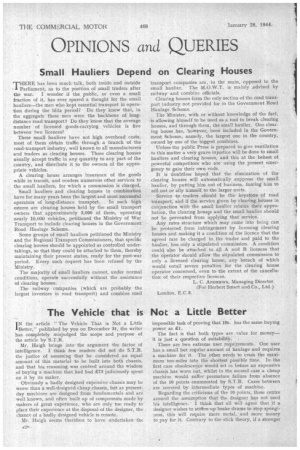OPINIONS and QUERIES
Page 30

If you've noticed an error in this article please click here to report it so we can fix it.
Small Hauliers Depend on Clearing Houses
THERE has been much talk, both inside and outside ,1 Parliament, as to the position of small traders after
the war. I wonder if the public, or even a small fraction of it, has ever spared a thought for the small hauliers—the men who kept essential transport in operation during the blitz period? Do they know that, in the aggregate these men were the backbone of longdistance road transport? Do they know that the average number of licensed goods-carrying vehicles is five between two licences?
These small hauliers have not high overhead costs; most of them obtain traffic through a branch .of the road-transport industry, well known to all manufacturers and traders as clearing houses. These clearing houses uSually accept traffic in any quantity to any part of the
• country, and distribute it to the owners of the appropriate vehicles.
A clearing house arranges insurance of the goods while in transit, and renders numeroas other services to the small hauliers, for which a commission is charged.
Small hauliers and clearing houses in combination have for many years been the largest and most successful operators of long-distance transport. In such high esteem are clearing houses held by the small transport owners that approximately 3,000 of them, operating nearly 10,000 vehicles, petitioned the Ministry of War Transport to include clearing houses in the Government Road Haulage Scheme.
Some groups of small hauliers petitioned the Ministry and he Regional Transport Commissioners, that specific clearing houses shouldbe appointed as controlled undertakings, so that they could be attached to them, thereby maintaining their present status, ready for the post-war period. Every such request has been refused by the Ministry.
The majority of small hauliers cannot, under normal conditions, operate successfully without the assistance of clearing houses.
The railway companies (which are probably the largest investors in road transport) and combine road transport companies are, in the main, opposed to the small haulier. The M.O.W.T. is mainly advised by railway and combine officials.
Clearing houses form the only section of the road transport industry not provided for in the Government Road Haulage Scheme.
The Minister, with or without knowledge of the fact, • is allowing himself to be used as a tool to break clearing houses, and through them, the small haulier. One clearing house has, however, been included in the Government Scheme, namely, the largest one in the country, owned by one of the biggest combines.
Unless the public Press is prepared to give ventilation to this matter a very grave injustice will be done to small hauliers and clearing houses, and this at the behest of powerful competitors who are using the present emergency to gain their own ends.
• It is doubtless hoped that the elimination of the clearing houses will automatically. suppress the small haulier, by putting. him out of business, forcing him to sell out or ally himself to the larger units.
Service to traders should be the keystone of road transport, and if the service given by clearing. houses in conjunction with -the small haulier retains their approbation, the 'clearing housis and the small. haulier should not be prevented from applying that service.
. Any rates structure which may come into being can .be protected from infringement by. licensing clearing houses .and ma-king it a condition of the licence that the agreed rate be charged to. the trader and paid to the haulier, less only a stipulated commission. A condition could, also be attached to all A and B licences . that -the operator should allow the stipulated commission to only a licensed clearing house, any breach of which would entail severe penalties for the clearing house operator concerned, even to the extent of the cancellation of their respective licences.
L. C. ANDREWS, Managing Director. (For Herbert Smart and Co., Ltd.) London, E.C.3.




















































